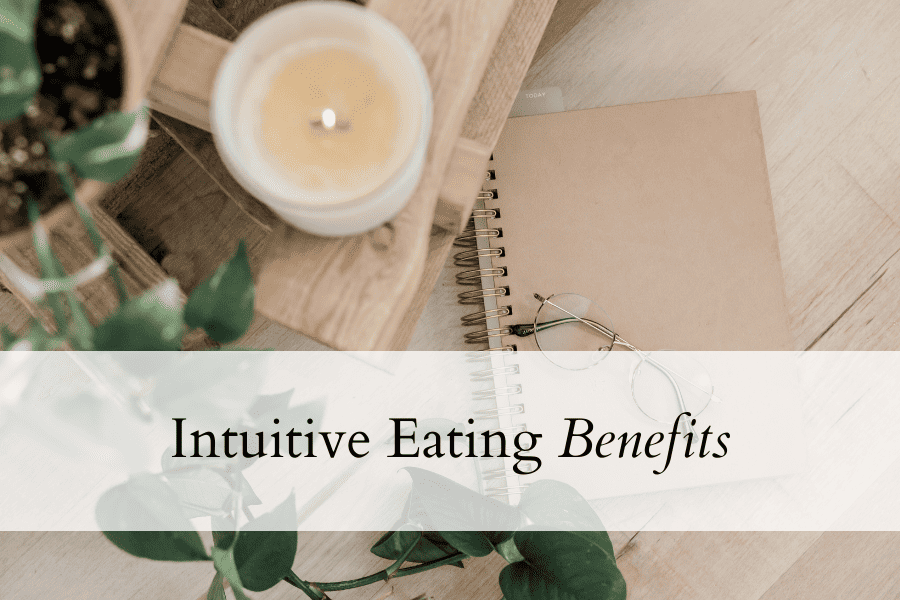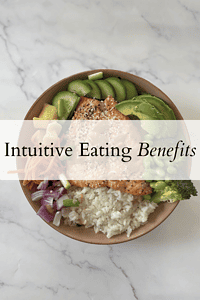Intuitive eating benefits are highly promoted on social media. e.g. "Intuitive eating for weight loss" and "intuitive eating before and after photos". However, is this an accurate representation of what intuitive eating is all about?
Intuitive eating benefits are vast. However, intuitive eating is often thrown around a little more "loosely" on social media. Although this is usually done with good intentions, it can take from the true meaning of intuitive eating.
As a Registered Dietitian, I am a big fan of intuitive eating. However, with many nutrition-related concepts, the truth often gets skewed. Intuitive eating is dangerous for some people when it is not approached correctly.
This post is all about the benefits of intuitive eating shown in research. Plus, I will break down the ten intuitive eating principles to help you get started on your intuitive eating journey.
Watch On YouTube 🎥
Prefer to sit back, listen or watch this information? Then lucky you! You can watch this content on YouTube below.
What is Intuitive Eating?
Intuitive eating is an eating style that promotes a healthy attitude toward food and body image. It includes ten flexible principles with a non-diet approach to eating. Individuals are encouraged to tune into themselves for the answers on what, how and when to eat. Non-diet means promoting sustainable behaviours, better body image, and a healthier relationship with food. The focus is not on the scales.
We are all born intuitive eaters. Think of babies who cry when they need food, stop when they’re full, and then cry when they need to eat again. There’s no defined schedule; they may eat more one day and less the next, but it all balances out.
As we grow up, we’re introduced to diet culture and diet rules (sometimes without even realising it!). We’re forced to clean the plate even if we’re full or push it away when we’re still hungry. We are told that certain foods are "bad" or "off-limits", and if we give in to this temptation, it is solely down to a lack of willpower. We are led to believe that certain bodies are more valued than others, which puts us under pressure to look a certain way.
Ultimately, unknown to us, we move away from responding to the direct messages of the body (e.g. hunger and fullness signals) to guide us on how to eat. Instead, we listen to external cues (fitness apps, meal plans, diet rules) about what, how much, and when we should eat. This can set off a cascade of unwanted food behaviours, including dieting, restricting, binging, emotional eating and obsessing about food. Intuitive eating is a counter to this. It teaches you how to get back to eating the way you were born to.
Intuitive Eating Benefits
Today, the research on intuitive eating is robust, with over 125 published studies showing intuitive eaters to have:
- Better body image
- More satisfaction with life
- Lower rates of disordered eating & eating disorders
- Lower rates of emotional eating
- Lower BMIs
- Lower frequency of weight cycling
We can clearly see that intuitive eating benefits both physical and mental health. We often talk about nutrition and health in a very clinical way, forgetting that the people behind the eating have complex thoughts and emotions. Mental health is health, too, and any dietary change that negatively affects mental health is unlikely to make you any healthier overall.
💫 Related Post: The Blue Zone Diet - Wholesome Eating To Live A Longer Life
The Ten Principles of Intuitive Eating
(Remember these are simply guidelines, not new diet rules)
If you want a comprehensive and in-depth guide to all the intuitive eating principles, I highly recommend the Intuitive Eating Book by Evelyn Tribole and Elyse Resch. These ladies are the original founders of intuitive eating, and their work is incredible.
1. Reject the diet mentality
Reject the system of dieting. Throw out the diet books. Remove the dieting apps. Declutter your Instagram feed from anything that offers you the false hope of losing weight quickly, easily and permanently. Reject diet culture and the lies that have led you on a spiral of dieting, restricting, binging, and then starting all over again on Monday. If you allow even one small hope to linger that a new, more effective diet might lurk around the corner, it will prevent you from being free to rediscover intuitive eating.
2. Honour your hunger
Give yourself permission to respond to your body’s biological need for food. Ignoring your hunger for too long can lead to a primal drive to over-eat, overriding the best intentions.
3. Make peace with food
End the war you have with food. If you tell yourself that a particular food is “off-limits” or “forbidden”, it can lead to intense feelings of deprivation. This can lead to uncontrollable cravings and often bingeing. People are often most scared about this principle, but you’ll be amazed at how much power food loses over you when nothing is restricted.
4. Challenge the food police
The food police are the thoughts in your head, your inner critic. They tell you you’re “good” for skipping breakfast or a “failure” for eating ice cream. Diet rules and regulations have been entirely created by diet culture and are now held deep in our psyche. Learning to recognise these voices and move away from these thoughts will help you to view food more neutrally.
5. Discover the satisfaction factor
Allow yourself to enjoy food again. When we view food solely as a source of energy or even as the enemy in our pursuit of weight loss, we can lose the joy of eating. When you eat what you want in an inviting environment, the pleasure you derive will be a powerful force in helping you feel satisfied and content.
6. Feel your fullness
To honour your fullness, you need to trust that you will give yourself the desired foods. Observe the signs that show that you are comfortably full. Take time to pause in the middle of eating to ask yourself how the food tastes and your current hunger level.
7. Cope with your emotions with kindness
Anxiety, loneliness, boredom and anger are emotions we all experience throughout life. Food won’t fix any of these feelings. It may comfort them in the short term, and sometimes that’s ok. But food will not solve the problem. Finding ways to cope with difficult emotions without using food is important.
8. Respect your body
All bodies deserve respect. We need to accept our bodies just as they are, regardless of shape or size. We don’t need to feel body-positive 100% of the time but respect your body so you can feel better about who you are. It is hard to reject the diet mentality if you are unrealistic and critical of your body size or shape.
9. Movement – feel the difference
Embrace the joys of moving your body without trying to change your physical appearance or earn your food. If you hate the gym, it might be time to quit, and that’s okay. There are many other ways to include movement that will feel fun and exciting. Everyone is unique in this respect; keep looking until you find what makes you happy. Focusing on how you feel from working out (e.g., energised) can make the difference between rolling out of bed for a brisk walk in the morning or hitting the snooze button.
10. Honour your health with gentle nutrition
Make food choices that honour your health and taste buds. Gentle nutrition teaches us that a healthy diet is varied, balanced and realistic. It does not exclude certain foods unless medical, ethical, or religious reasons need to be prioritised. Remember that there is no such thing as the “perfect” diet. You will not suddenly become unhealthy or get a nutrient deficiency from a tiny snack, meal or day of eating. Gentle nutrition is about the bigger picture of what you eat most of the time.
This post was all about intuitive eating benefits and intuitive eating principles.
Other posts you may like:
💫 How to Understand your Cholesterol Results and WHY you need to know this
Check me out on YouTube!
🎥 Visit my YouTube Channel to learn more about my approach to eating.







Leave a Reply